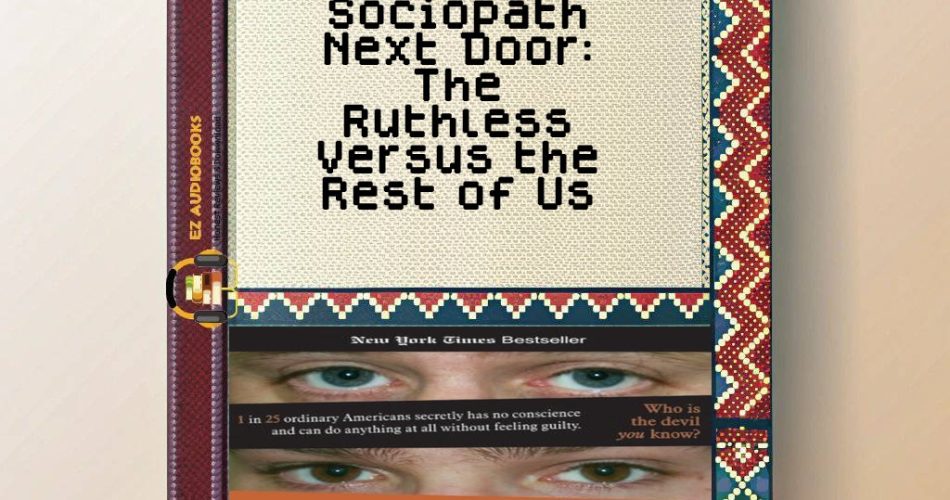Audiobook Sample
Listen to the sample to experience the story.
Please wait while we verify your browser...
- Title: Sociopath Next Door: The Ruthless Versus the Rest of Us
- Author: Martha Stout
- Narrator: Shelly Frasier
- Length: 07:30:00
- Version: Abridged
- Release Date: 01/06/2005
- Publisher: Tantor Media
- Genre: Business & Economics, Business Development
- ISBN13: 9.78E+12
As someone who has spent decades analyzing narratives – both fictional and painfully real – I approached Martha Stout’s “The Sociopath Next Door” with equal parts scholarly curiosity and personal trepidation. The audiobook experience, narrated with clinical precision by Shelly Frasier, becomes an unsettling mirror held up to our social fabric. Through a cultural lens shaped by my cross-continental academic journey – from Yale’s Gothic libraries to Tokyo’s neon-lit bookstores – I find Stout’s thesis both revolutionary and terrifyingly plausible.
What fascines me most is how Stout dismantles our collective mythos of sociopathy. Like analyzing Murakami’s surreal characterizations in “Kafka on the Shore”, I found myself parsing Stout’s case studies for literary verisimilitude. Her revelation that 4% of the population lacks conscience echoes through my memory of a charismatic department chair who systematically destroyed careers while maintaining campus-wide admiration. The audiobook format intensifies this realization – Frasier’s measured tones make clinical descriptions of emotional vacuity feel like a detective novel about your own life.
Shelly Frasier’s narration deserves particular praise for its therapeutic balance. Where a less skilled narrator might sensationalize, she delivers Stout’s psychological analysis with the steady cadence of a forensic examiner. Her vocal restraint during descriptions of sociopathic behaviors (the pity plays, the flattery traps) creates chilling contrast against passages about their victims’ anguish. The audio production wisely avoids melodramatic flourishes, letting the content’s inherent tension build naturally – a technique I often discuss in my Digital Humanities seminars when analyzing how form shapes impact.
This reminds me of when I led a Berkeley workshop comparing print and audio versions of “Gone Girl”. Just as Flynn’s unreliable narrator gains new dimensions through audio performance, Stout’s clinical observations transform when heard aloud. There’s visceral power in hearing phrases like ‘the mask of sanity’ while commuting or doing dishes – the domestic backdrop making the content more implicating. The audiobook format also highlights Stout’s masterful structure: her case studies unfold with short-story precision, each a complete character study reminiscent of Alice Munro’s compressed narratives.
Yet for all its strengths, the work occasionally stumbles where literature excels. Stout’s sociopaths sometimes feel like archetypes compared to the nuanced antiheroes in Dostoevsky or Patricia Highsmith. The binary framing – ruthless vs. rest of us – lacks the moral ambiguity I cherish in great fiction. However, as my Tokyo students taught me during our “Rashomon” unit, sometimes clarity serves better than ambiguity when lives are at stake.
Compared to similar psychological works like “The Psychopath Test” (which Frasier also narrated), Stout’s approach feels more urgently practical than Ronson’s journalistic romp. The listening experience becomes a survival guide, particularly in sections about ‘the rule of threes’ for identifying conscienceless behavior. I found myself mentally cataloguing past encounters – the landlord who evicted single mothers with a smile, the colleague who plagiarized with righteous indignation – with new understanding.
For potential listeners, I’d recommend pairing this with Margaret Atwood’s “Stone Mattress” stories during long walks. Both explore predation in civilized contexts, creating a fascinating intertextual dialogue between clinical and creative perspectives. The audiobook’s relatively brief duration (under 4 hours) makes it ideal for contemplation in discrete sessions – though you may find yourself replaying chapters as I did, testing Stout’s theories against memory.
With scholarly solidarity and a newly vigilant heart,
Prof. Emily Chen

